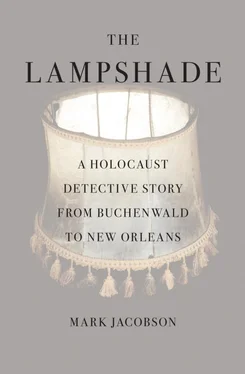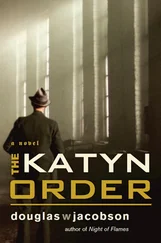“I always avoided talking with her about the war,” Köhler told the Times . “She said she was the victim of libels, lies and perjury but I didn’t discuss it with her further because it was painful for her… I can’t really imagine what it was like. I am not even convinced she is guiltless. I feel she just slithered into the concentration camp world like any others without being able to do anything about it.” Köhler continued to see his mother until one day in September 1967, when he arrived at the prison for his monthly visit to find that she had hanged herself in her cell the day before.
When he spoke with the Times, Köhler was twenty-three years old, “making a good living in the insurance business,” and attempting to rehabilitate his mother’s name, the prospects of which he called “practically hopeless.” After that, Köhler disappeared from public view.
Given this past, perhaps turning up on Köhler’s doorstep unannounced was a cruel thing to do. My only excuse was that I’d tried to call the number provided without success and my letter had gone unanswered. It is a reporter’s sickness, this barging in. The truth was I didn’t have any list of probing questions for Uwe Köhler. I had no right to put him on the spot. If his mother had turned men into lampshades, it was certainly no fault of his. Still, I felt a need to see him, to speak with him, if for only a moment. So much about the lampshade was fleeting, impossible to pin down. But here there was a connection, a direct line, in the blood. To stand next to Uwe Köhler might be as close as I’d ever get to Ilse Koch and whatever happened in the Buchenwald pathology lab.
I knocked. No one answered. I was thinking of leaving a note when a youngish, dark-haired man called to me from the road. He lived in the house, he said, and didn’t recognize Uwe Köhler’s name. Perhaps someone named Köhler had lived there many years ago, or resided in another house in the town. It was difficult to tell if the man was telling the truth or not. I couldn’t imagine that I was the first lampshade hunter to arrive in town looking for Uwe Köhler. Either way, it was stupid to stand out here in the rain, the man said. He managed the tavern across the road, and I should come in and have a beer.
The bar was rustic in a cozy, deeply unsettling Bavarian way. It was a lucky thing I’d come by, said the man, now standing beside his cheerful blond wife, with whom he ran the tavern. A good friend of theirs was stopping in and he was bringing his accordion; this was a real treat, they said, especially since, as they were sure I would notice, he looked “exactly like our Austrian cousin, you know, Hitler.”
A few minutes later, Mishi, a large, white-faced man wearing a denim mechanic’s jumpsuit, came through the door carrying a mother-of-pearl-inlaid accordion. I had to admit, despite his huge size and lack of mustache, he did look a little like Hitler.
We drank and chatted, aided by the bartender, acting as translator. Mishi was very put out by the ingress of immigrants into Bavaria. It wasn’t that he minded so much that “Munich is full of Arabs,” Mishi said. What bothered him was “these people do not know to act in a proper German way.” Mishi felt entitled to say this, being an immigrant himself. His family came to Bavaria from Kosovo in 1890, so he was not a native German and had never forgotten that fact. To become a “real German” was a long process. It wasn’t as easy as making out a tax return. It was a matter of blood and soul, he said, picking up his accordion.
Settling in a chair, Mishi flashed a smile and shouted, “Since four forty-five we are shooting back.” This apparently was his customary opener, the way another musician might say, “Hit it,” or count off, “1, 2, 3, 4.” Later it was explained to me that this was what Hitler said the morning the Reich attacked Poland to begin World War II: after a specious report of Polish gunfire, the Führer went on the radio to inform the Volk that as of 4:45 a.m., the German army was returning fire.
With that intro, Mishi launched into “Rivers of Babylon,” a spiritual adapted from Psalm 137: “By the rivers of Babylon, where we sat down, there we wept when we remembered Zion.” Mishi sang it beautifully, too, his pure tenor lifting over the squeezebox licks. Perhaps it was the odd confluence of tune and setting—the sad song of homesick Jews sung in a Bavarian bar by a man who was happy to look like Hitler—but by the time he got to the part about “so let the words of our mouth and the meditation of our heart be acceptable in thy sight,” I was a bit choked up. When he finished, I clapped and told him how much I enjoyed his performance, especially since “Rivers of Babylon” had been one of my favorite songs ever since I first heard it in the Jamaican film The Harder They Come . Adapted from the biblical original by the Rastafarian band the Melodians, the song celebrates an otherworldly kind of logic, Rastas being under the impression they are a tribe of Africans stranded in a tropical Babylon where they do not belong. The idea of former slaves, forcibly exiled from their home, inventing such a seemingly outlandish yet sanity-saving cosmology has always touched me.
“Who?” Mishi asked.
“The Melodians. From Jamaica.”
Mishi shook his head. “This is not from Jamaica. It is from Boney M.”
Boney M. I had forgotten about Boney M., the disco band put together by German entrepreneur Frank Farian, who later was the mastermind behind the black duo Milli Vanilli, the only group ever to have their Grammy Award revoked for not really singing on their records. Like Milli Vanilli, Boney M. had a visual crossover racial appeal, but their voices were electronically altered to mask any undue evidence of ethnicity. In 1978 they had had what is called a “Eurodance hit” with a cheesy version of “Rivers of Babylon” that played in every hotel bar from Scottsdale, Arizona, to Mogadishu.
Mishi was done playing. On my way out he wished me luck finding “your friend Uwe.”
Authenticity was a hell of a thing, I thought, driving across the Hitlerscape near Berchtesgaden. Were things ever as they were supposed to be?
Sixty-five years ago, as a member of the 133rd Engineers Corps attached to George Patton’s Third Army, my father came through here. His unit built numerous bridges in advance of the front lines, and by the time they came to Berchtesgaden, it was June 1945. The war was over. My father had a picture taken of himself sitting on Hitler’s balcony with the Alps behind him and sent it to my mother. My parents are both long dead, but the picture is my all-time favorite: a two-inch-square Brownie print with crinkle-cut edges showing Dad, in his uniform, puffing on his pipe, the same pipe I often saw him smoke after dinner in Flushing, Queens. It is a sunny day; the light glints off his wedding ring. You can’t miss it. On the back of the photo, my father wrote, in his familiar angular handwriting, “On Hitler’s balcony, me too, the ring is shiny, huh?”
I may have never taken the time to notice it while growing up, but my parents had a brilliant, thrilling romance. They were married only days before my father shipped out in 1944 to return to the Old Country from whence his own mother had fled the Cossacks and a whole galaxy of anti-Semites. Now he returned to help vanquish the greatest of Jew-killers. My parents’ fate, and my own, was tied up with beating the Germans, crushing them to rubble. To sit on Hitler’s balcony, smacking the ashes of his civil servant’s pipe onto the grounds where the Führer once took tea with Eva Braun, that was the payoff, a most perfect spike of the football. I look at the reflection from my father’s ring and know that, even before I was born, at least some of its glow was intended for me, his way of sharing that moment of love and triumph with the unborn son who soon would be cracking up his Plymouth station wagon on the West Side Highway.
Читать дальше












